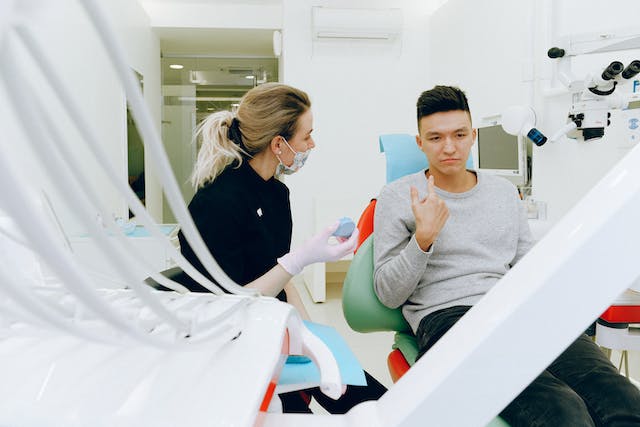The journey to a lifetime of healthy smiles begins in childhood, and ensuring your child receives the best oral care is a crucial aspect of their overall well-being. Vaughan childrens dentistry focuses on the unique needs of young patients, providing specialized care that sets the foundation for a lifetime of good oral health.
Introduction
A. Definition of Children’s Dentistry
Children’s dentistry, also known as pediatric dentistry, is a specialized branch of dentistry that caters specifically to the oral health needs of infants, children, and adolescents.
B. Importance of Pediatric Dentistry
The early years of a child’s life are pivotal for oral development. Pediatric dentistry plays a vital role in preventive care, addressing dental issues early, and educating both children and parents on maintaining optimal oral health.
The Role of a Pediatric Dentist
A. Specialized Training
Pediatric dentists undergo additional training beyond dental school, equipping them with the skills to address the unique challenges of treating young patients. Their specialized knowledge ensures a child-friendly and effective approach to dental care.
B. Child-Friendly Approach
One of the defining features of pediatric dentistry is its emphasis on creating a positive and comfortable experience for children. From the design of the dental office to the communication style, everything is tailored to make young patients feel at ease.
C. Common Procedures in Children’s Dentistry
Pediatric dentists perform a range of procedures, including dental cleanings, fluoride treatments, and the application of dental sealants. They are also skilled in managing dental emergencies and providing orthodontic consultations for young children.
When to Start Pediatric Dental Visits
A. Age Recommendations
The American Academy of Pediatric Dentistry recommends that a child’s first dental visit should occur by their first birthday or within six months of the eruption of their first tooth.
B. Early Intervention for Oral Health
Early dental visits allow for the identification of potential issues and the implementation of preventive measures. Regular check-ups from an early age contribute to a positive attitude toward oral health.
Creating a Positive Dental Experience
A. Child-Centered Dental Offices
Pediatric dental offices are designed with children in mind, featuring colorful decor, kid-friendly waiting areas, and a welcoming atmosphere. These elements contribute to a positive and stress-free dental experience.
B. Importance of Dental Education for Parents
Educating parents about the importance of oral health and proper dental care at home is an integral part of pediatric dentistry. Informed parents play a crucial role in maintaining their child’s dental well-being.
Common Pediatric Dental Issues
A. Cavities and Tooth Decay
Cavities are a common concern in children, emphasizing the need for regular dental check-ups and proper oral hygiene practices at home.
B. Developmental Problems
Pediatric dentists monitor the development of teeth and jaws, addressing any developmental issues that may arise.
C. Orthodontic Concerns
Early detection of orthodontic problems allows for timely intervention, potentially reducing the need for extensive orthodontic treatment later in life.
Preventive Measures for Children’s Oral Health
A. Importance of Regular Check-ups
Regular dental check-ups enable early detection of issues, allowing for prompt intervention and preventive measures. If you check out this dentist in Jenkintown PA, they’ll advise visiting a dental expert every 6 months.
B. Dental Hygiene at Home
Parents play a crucial role in teaching their children proper dental hygiene habits, including regular brushing, flossing, and a balanced diet.
C. Balanced Nutrition for Healthy Teeth
A well-balanced diet contributes to overall health and positively impacts dental health. Encouraging children to make healthy food choices supports the development of strong and cavity-resistant teeth.
Overcoming Children’s Dental Anxiety
A. Gentle Techniques
Pediatric dentists use gentle techniques to minimize discomfort, ensuring that children have a positive and stress-free experience.
B. Distraction Techniques
Child-friendly dental offices often incorporate distraction techniques, such as age-appropriate entertainment, to help children feel at ease during their visit.
C. Building Trust with the Dentist
Establishing trust between the child and the dentist is crucial. Pediatric dentists take the time to build rapport and create a trusting relationship with their young patients.
Specialized Pediatric Dental Services
A. Orthodontics for Children
Early orthodontic consultations help identify and address potential orthodontic issues, setting the stage for optimal oral development.
B. Sedation Dentistry in Pediatrics
For children with dental anxiety or those undergoing extensive procedures, sedation dentistry provides a safe and controlled environment, ensuring a comfortable experience.
Parental Involvement in Children’s Oral Health
A. Setting a Positive Example
Parents serve as role models for their children. Demonstrating good oral hygiene practices and a positive attitude toward dental care encourages children to prioritize their own oral health.
B. Monitoring Oral Hygiene Practices
Supervising and assisting children in their oral hygiene routines ensures that they develop effective habits from a young age.
Advancements in Pediatric Dentistry
A. Technology and Child-Friendly Equipment
Advancements in dental technology contribute to more efficient and comfortable treatments for children. Child-friendly equipment and techniques further enhance the overall dental experience.
B. Emerging Trends in Pediatric Oral Care
From teledentistry options to interactive educational tools, emerging trends in pediatric oral care aim to make dental visits more accessible and engaging for young patients.
Conclusion
A. Recap of the Importance of Children’s Dentistry
Children’s dentistry lays the groundwork for a lifetime of healthy smiles. Early intervention, preventive care, and a positive dental experience contribute to optimal oral health.
B. Encouragement for Parents to Prioritize Oral Health
Empowering parents with knowledge and emphasizing the role they play in their child’s oral health encourages a proactive approach to dental care from a young age.







